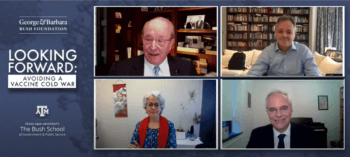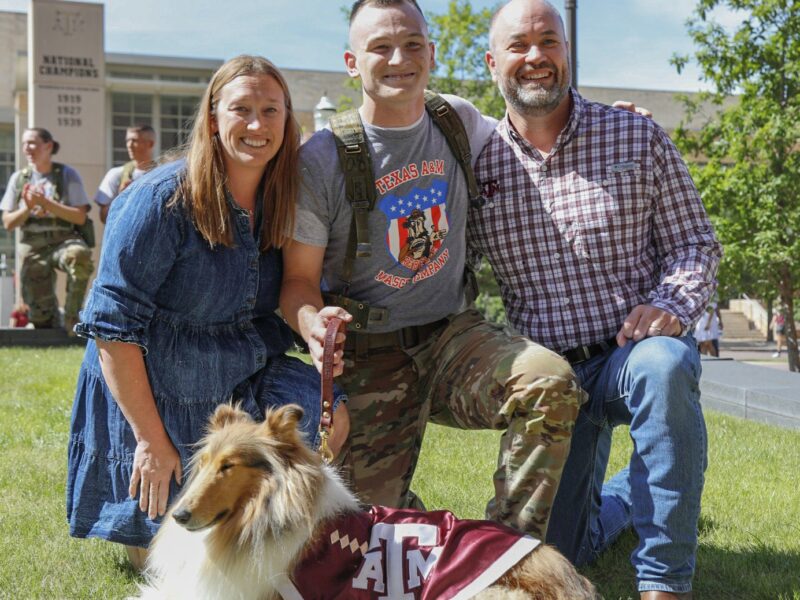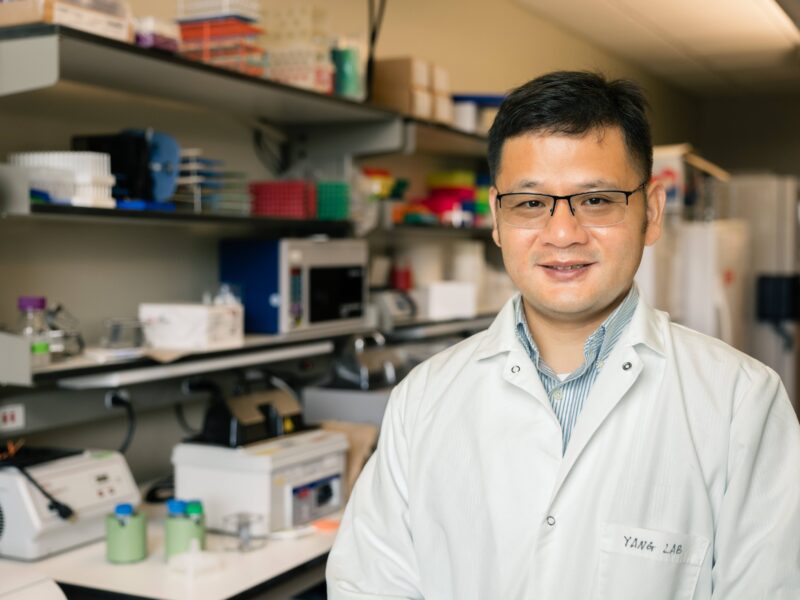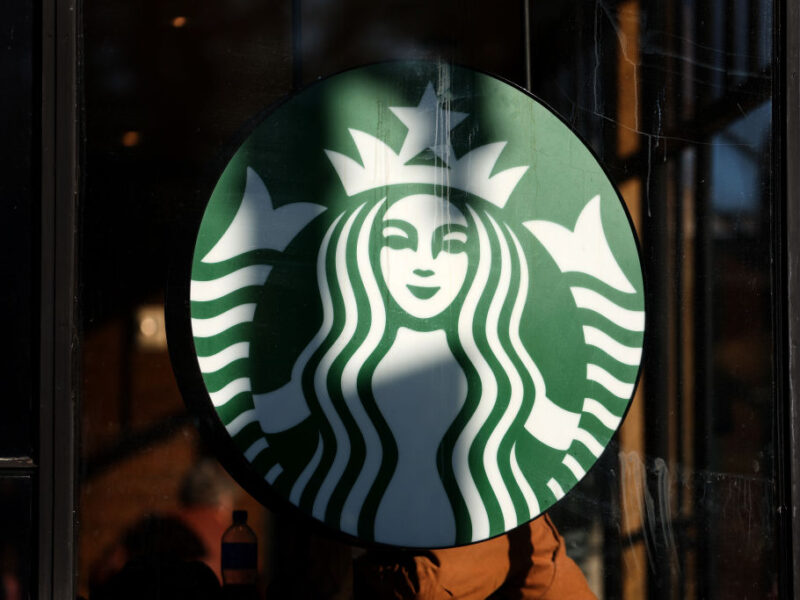Avoiding A Vaccine Cold War

Without multilateral action, bold leadership and collaboration to develop and equitably distribute a vaccine, the COVID-19 pandemic could lead to a “new Cold War,” leading science and health authorities said Thursday during a virtual discussion.
Moderated by Dr. Martin J. Murphy, Jr., founding chief executive officer of the CEO Roundtable On Cancer, the event hosted by the George & Barbara Bush Foundation and Texas A&M University’s Bush School of Government and Public Service focused on the global challenge of producing a vaccine to end the pandemic.
Murphy, a friend of the Bush family, noted that former President George H.W. Bush helped end the last Cold War by working closely with allies, and the novel coronavirus will similarly “only be staunched with a coordinated worldwide effort.”
“In the last Cold War, the world’s superpowers controlled nuclear warheads atop intercontinental ballistic missiles,” Martin said. “These powers then wielded influence on the rest of the less powerful world. We are now faced with superpowers that may control life-sparing vaccines.”
Sir Jeremy Farrar, director of the Wellcome Trust – one of the world’s leading foundations supporting biomedical research – said the world underestimates “where we stand” in the pandemic, which runs the risk of leading to “another polarized Cold War.”
The only solution, he said, will be through the application of science toward a vaccination and the equitable access to benefits of that science.
World Health Organization (WHO) Chief Scientist Soumya Swaminathan echoed that solidarity will be “the only way out” of the pandemic. The novel coronavirus doesn’t respect borders, nationalities, politics, gender, or age, she said, and spreads most effectively where there is division and discord.
Swaminathan said there’s been “tremendous global cooperation, collaboration and willingness to work together” among scientists, doctors, health care workers, researchers and others to develop diagnostics, drugs and treatments, and vaccines to end the pandemic. It’s the “best hope for us” to end the acute phase of the pandemic, she said.
WHO’s Access to COVID-19 Tools Accelerator (ACT-Accelerator), which launched in April, brings together global health organizations, scientists, governments and others to accomplish this goal. Swaminathan said it’s imperative to ensure vaccines are delivered to people who need them, regardless of whether they live in high- or low-income countries.
“Enlightened Self-Interest”
There’s no way out of the pandemic for any country, rich or poor, until every country is safe, Farrar said, making it an “exemplar of enlightened self-interest.”
“This will define the sort of way we want the world to be in the 21st century, and will reverberate through many other issues for many, many years to come,” he said.
Dr. Richard Hatchett, chief executive officer of the Coalition for Epidemic Preparedness Innovations (CEPI), said the tools need to be provided to all countries simultaneously to prevent extending the pandemic and leading to greater loss of life and economic devastation. Hatchett, who previously served in the White House administrations of former presidents George W. Bush and Barack Obama, said CEPI has provided funding for the development of several COVID-19 vaccine candidates.
Nine candidates supported by CEPI are part of the COVID-19 vaccine Global Access Facility (COVAX), a global initiative working with governments and manufacturers to make sure vaccines are available worldwide to all countries. More than 170 countries had expressed intent to participate in COVAX as of Thursday, he said.
“This is not only the right thing to do from a moral perspective, but it’s also the right thing to do from an efficiency perspective, because it is only by sharing what will be a scarce resource for at least the next 18 months to two years and making sure we get the vaccine to those who need it most… that we will be able to take the edge off the pandemic,” Hatchett said.
Vaccine Development
Hatchett estimates the cost to procure and distribute a vaccine globally would be more than $20 billion. CEPI has raised about $1.4 billion, in addition to about $1 billion from its partners at Gavi, the Vaccine Alliance.
“$20 billion is an enormous sum of money until you compare it with the damage of the global economy that is being done every single month,” he said.
Swaminathan said the entire cost needed for the ACT-Accelerator, about $35 billion, is equal to less than two days-worth of the economic damage caused by COVID-19-related disruptions around the world. In addition to a strong moral imperative, she said, there’s also an economic argument in making a vaccine equally available to all people.
The sooner the pandemic ends, Swaminathan said, the sooner economies can begin to recover, children can go back to school, employees can return to offices and life can return to a semblance of normality.
“Even for the high-income economies, it is much better to bring everyone back at the same time than it is to let it linger on and drag on,” she said.
Toward this effort, the federal government in July reserved a high-tech bio-manufacturing facility in Bryan-College Station for mass production of a COVID-19 vaccine. The task order between the government and the Texas A&M University System’s Center for Innovation in Advanced Development and Manufacturing (CIADM) is valued at $265 million.
Three facilities built through the program are owned and operated by FUJIFILM Diosynth Biotechnologies, Texas, a subcontractor of The Texas A&M University System. The College Station facility has been tapped to produce the COVID-19 vaccine candidate of Novavax, Inc., NVX-CoV2372.
Greg Hartman, Texas A&M Health Science Center chief operating officer and senior vice president, said during the discussion that manufacturing will be ready to begin in January 2021.
Media contact: Caitlin Clark, caitlinclark@tamu.edu





